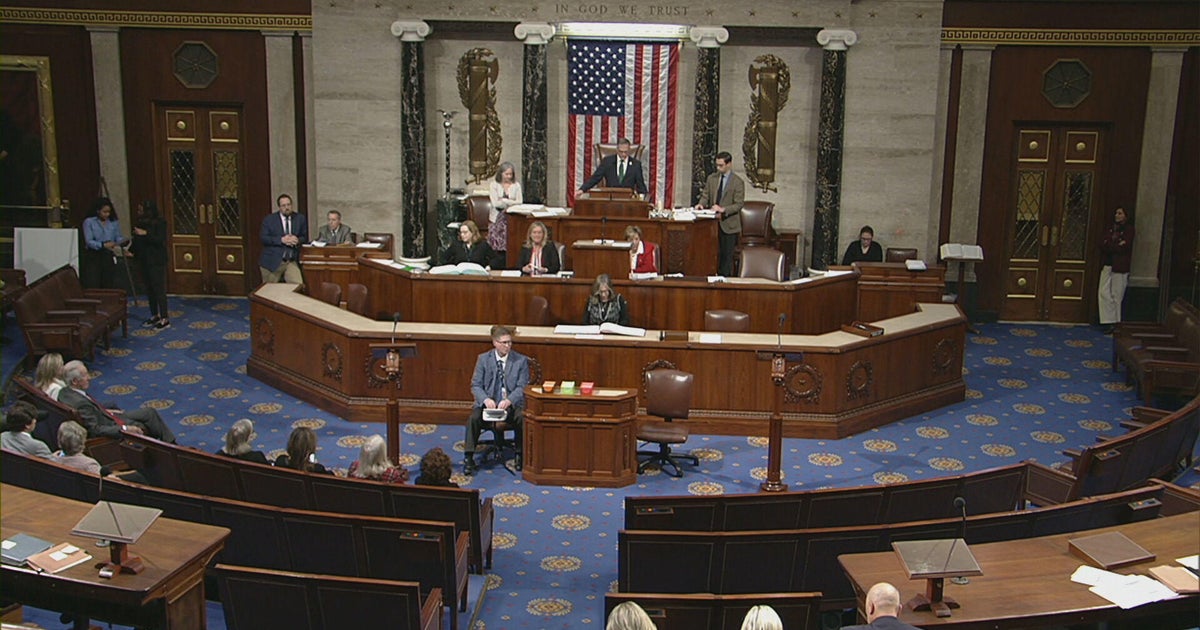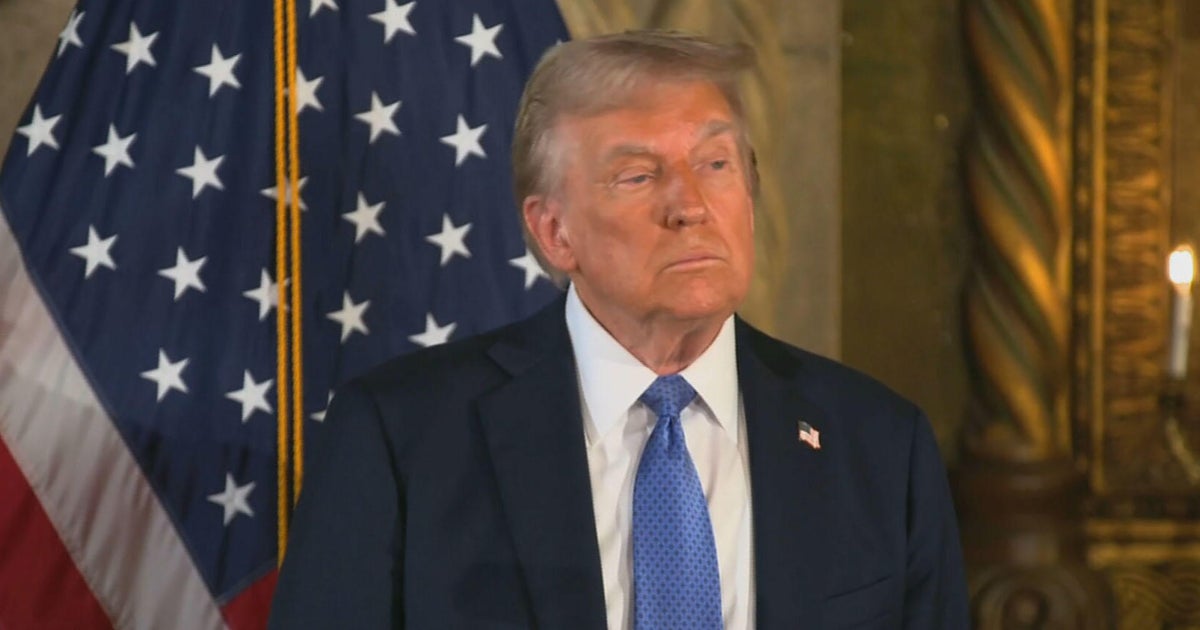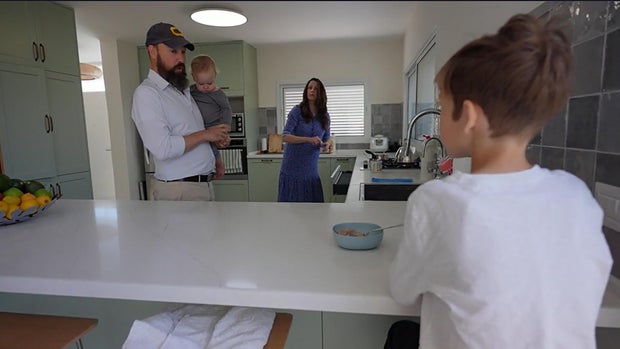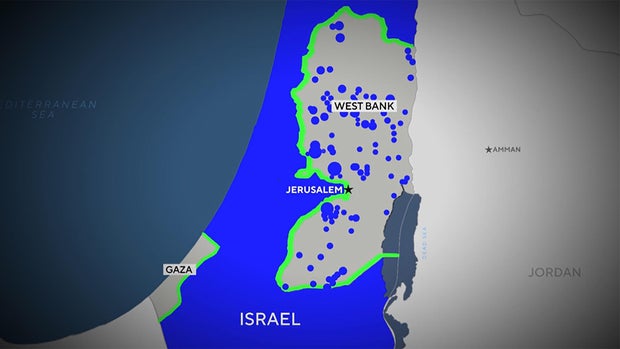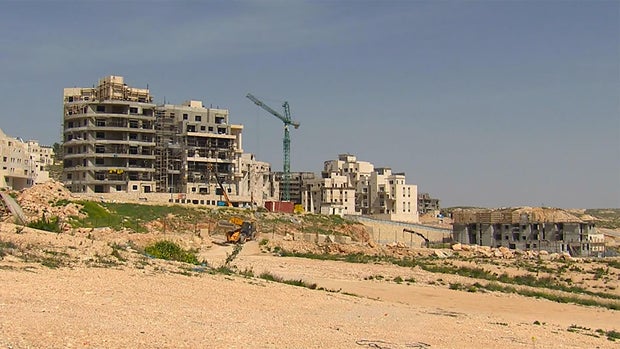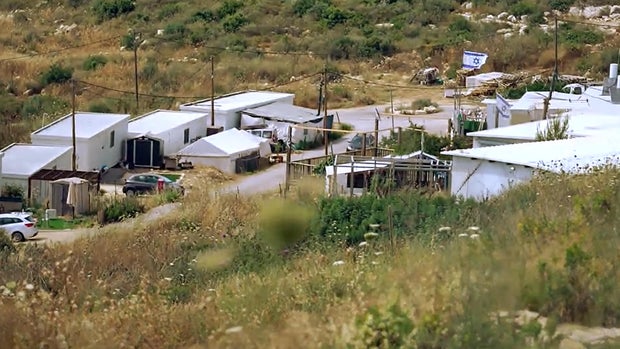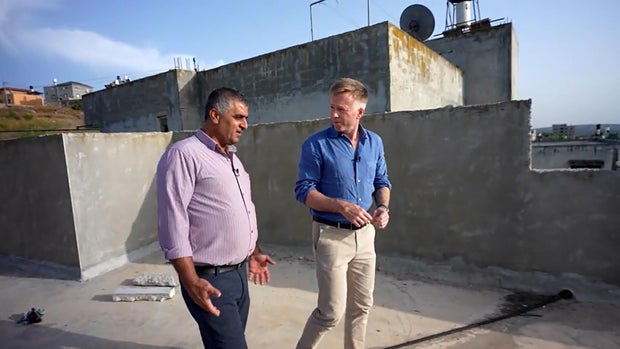CBS News
Looking ahead after a Trump victory

Watch CBS News
Be the first to know
Get browser notifications for breaking news, live events, and exclusive reporting.
CBS News
Israeli settlements, and the expanding divide of settlers and Palestinians
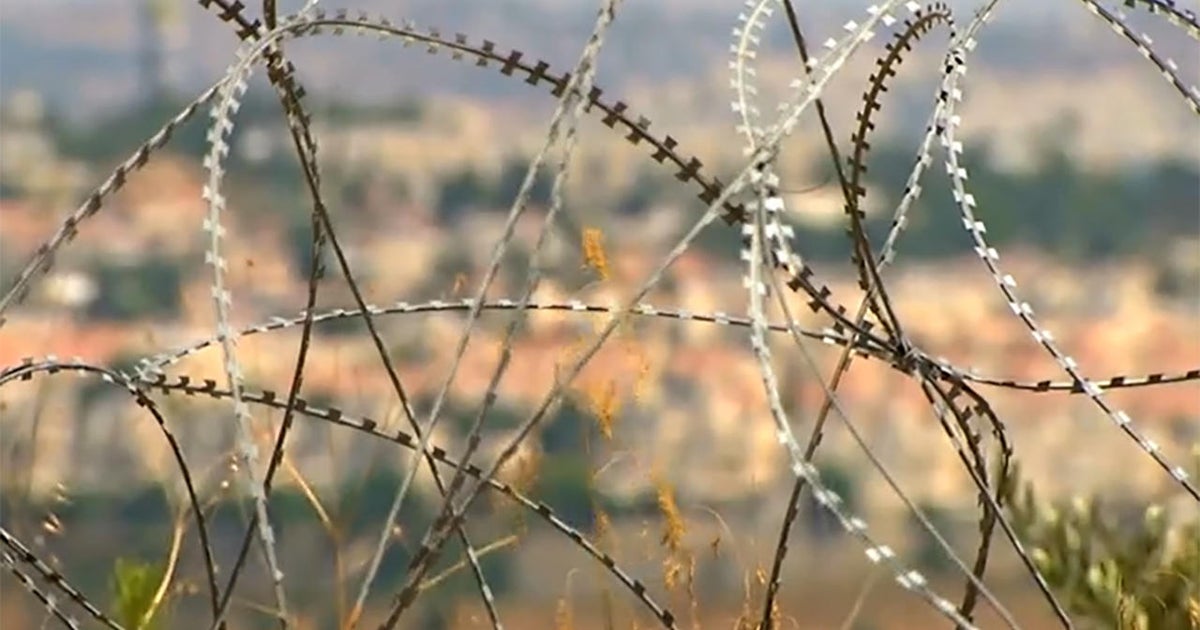
West Virginia native Rachel Braslavi says she moved into her new home so that her family could have more space, and more of a community feel. But she faces bigger questions than she might with a typical home purchase. Their community is the Israeli settlement of Karnei Shomron, located inside the occupied West Bank.
Asked if she sees her family of settlers as impediments to peace, Braslavi replied, “No. I don’t. I really don’t. I feel that we have a right to be here. And I feel that the Palestinians have a right to be here.”
“On this land?” I asked.
“Not this house,” Braslavi said. “But I mean, in the area.”
CBS News
This settlement, like hundreds of others, is carved into Palestinian land, surrounded by a security fence. The border separating the West Bank from Israel is called the Green Line. It was drawn as part of an armistice agreement following the 1948 Arab-Israeli war, which was sparked when the modern state of Israel was formed.
But after Israel’s stunning military success in the Six Day War of 1967, Israel took more land, occupying the Palestinian territories, and Israeli citizens began building settlements.
Today, upwards of 700,000 Israelis live in these communities, which the United Nations calls illegal. They’re scattered inside the West Bank and East Jerusalem. About 15% of settlers are Americans.
CBS News
But Rachel Braslavi does not see herself as living on Palestinian land: “No. I don’t. I think that some of the first places that Jews arrived to back in Biblical times were in Judea and Samaria. So, to me, this is part of our indigenous right to be here.”
I asked, “How much of your decision to move here to a settlement was cost of living versus ideology?”
“I came from America when I was in my 20s to live in Israel,” she said. “And I kind of thought of that move as, like, my contribution to the Jewish people in our homeland. It didn’t matter where I lived in Israel.
“And my husband grew up here, and he saw it differently. He really thought, to contribute in a meaningful way, it was moving across the Green Line and establishing, like, facts on the ground.”
“What does ‘facts on the ground’ mean?”
“Just strengthening the existing Jewish communities in Judea and Samaria,” Braslavi replied.
“In the West Bank?
“Yes.”
The settler population has grown more than 200 percent since 2000. The Israeli government encourages these moves, paying for the military to guard them, and funding public services like buses and schools.
CBS News
Judith Segaloff moved to Karnei Shomron seven years ago from Detroit, and says she was able to afford a bigger house here than she would have on the other side of the Green Line. She took us on a tour. “Across the street is our mall,” she said. “We’ve got an ice cream shop. Here’s our sushi shop.”
I asked, “Do you have friends or family who don’t agree with you living in a settlement?”
“For sure,” Segaloff said. “Some of them won’t come visit.”
Segaloff says she’s excited by plans to expand a settlement just up the road. She believes Israeli presence offers security.
CBS News
“But it’s also a contested place,” I said, “a place considered an occupied territory.”
“By some,” Segaloff said.
“By the international community.”
“Well, they’re gonna have to get over it,” Segaloff said. “You cannot live among people who want to kill you. They’re just gonna have to move over and let us in.”
But not far away, on the other side of checkpoints and a security barrier, we met Palestinian Saher Eid, who lives in the West Bank village where his great-grandfather was born.
Asked about settlers’ claims that – historically, Biblically – the land is theirs, Eid said, “We have documents that prove we own this land, which we’ve farmed since forever. Ask the settlers where they are from?”
He and his wife, Tamador, a high school science teacher, invited us to tea. They say they’re most concerned about rising violence from Israeli settlers, emboldened by Benjamin Netanyahu’s increasingly right-wing government. Since October 7th last year, the U.N. figures there have been more than 1,400 attacks by extremist settlers against Palestinians or their property.
The Eids are also frustrated that the fence and checkpoints around a settlement have cut them off from their own olive trees. Saher said his freedom was taken away: “He stole my land. He stole my olives. He stole everything.”
CBS News
I asked, “Is there any space for introspection here? Do you ever think, ‘Maybe we aren’t the best partners to try to find a path toward peace’?
“We believe that if there was a Palestinian state without settlements, there would be wide support for peace,” Saher said.
The differences on this side of the security barrier are stark. Incomes are a fraction of those in Israel, and Israel controls the water and much of the tax revenue.
Saher said he would welcome an Israeli who lives in Tel Aviv into his home, but not a settler: “No, because he’s a thief.”
Assaf Sharon, a professor of political and legal philosophy at Tel Aviv University, noted, “James Carville coined the phrase, ‘It’s the economy, stupid.’ In Israel-Palestine, ‘It’s the settlements, stupid.'”
In regards to settlers who claim that they did not take anyone’s land, that no one was living there before them, Sharon said, “Well, of course, it wasn’t done individually. Occupying a land doesn’t mean you have a house on it. It can be grazing land. It can be land reserves for future building. And it can be just the area that is reserved for self-determination of a people.”
“Settlers make a security argument, that Israel is safer with the settlements,” I said.
“The security argument is completely bogus,” Sharon replied. “The settlements are not a security asset; they are a security burden, because defending, protecting scores of civilians, deep in densely populated Palestinian territory, is one hell of a burden for the military.”
He added, “The best way to ensure Israel’s security is to have partnership with the state or state-like entity that has an interest in preventing precisely this kind of hostile activity.”
David Makovsky, a fellow at the Washington Institute for Near East Policy, said, “We have ideologues on both sides of this equation that are determined to thwart any accommodation.”
In 2013, Makovsky was part of the team trying to negotiate a peace deal. That failed proposal, and two others, would have seen Palestinians keep about 95% of the West Bank.
But today, with the increasing number of settlements – blue dots on the map, some far from the Green Line – it may be even more complicated to determine borders in a two-state solution.
The negotiations changed under Donald Trump, said Makovsky: “Until Trump, all of the U.S. peace approaches were similar. Under Trump, working with Prime Minister Netanyahu, he doesn’t want to pick and choose which settlements make it and which don’t. So, the prime minister convinced the president that every single settlement is called Israel. Now that creates an impossible situation of Swiss cheese. Any Palestinian entity is now going to be dotted with settlements.”
Now, settlers may have another ally with sway in President-elect Trump’s nominee to be the next ambassador to Israel: Mike Huckabee, who has said he’s open to annexing parts of the West Bank.
But there is historical precedent for evacuating settlements. Almost 20 years ago, the Israeli government advocated that leaving Gaza was a path to peace.
According to Makovsky, “2005 is for the settlers their Waterloo, their defeat.” That’s when Israel removed all 8,000 settlers from Gaza.
Back then, I profiled a 17-year-old who was being forced to leave Gush Katif, her settlement in Gaza. Nineteen years later, settlements are still front-page news. “Yes, that’s how it is in Israel,” said Rachel Yechieli Gross. Today, she is now a mom with three kids, and no longer lives in a settlement.
I asked, “The fact that you left your home, your settlement as a teenager, shows that settlements can be closed. Might that be a step toward peace?”
“After October 7th, I’m not so sure anymore, because I really believed that there could be change,” said Gross. “But I don’t feel that anymore.”
Makovsky blamed the terror group Hamas, which he said “has really led to the growth of the Israeli right. If people in Israel thought that a Palestinian state was Costa Rica, they would line up to sign, ’cause they want to end the conflict. They just want to be safe. But if they feel a Palestinian state is a mini-Iran, you can’t find enough people in the phone booth.”
Back in the West Bank, Rachel Braslavi and her family are just five of the 700,000 Israeli settlers who are working to change, as she puts it, “the facts on the ground.”
“I wouldn’t leave willingly, because I’m raising my family here and I’ve, you know, built my dream home,” she said. “Why does the peace agreement have to be at my expense, to give up my home?”
For more info:
Story produced by Sari Aviv. Editor: Ed Givnish.
CBS News
Transcript: Alejandro Mayorkas on “Face the Nation with Margaret Brennan,” Dec. 22, 2024
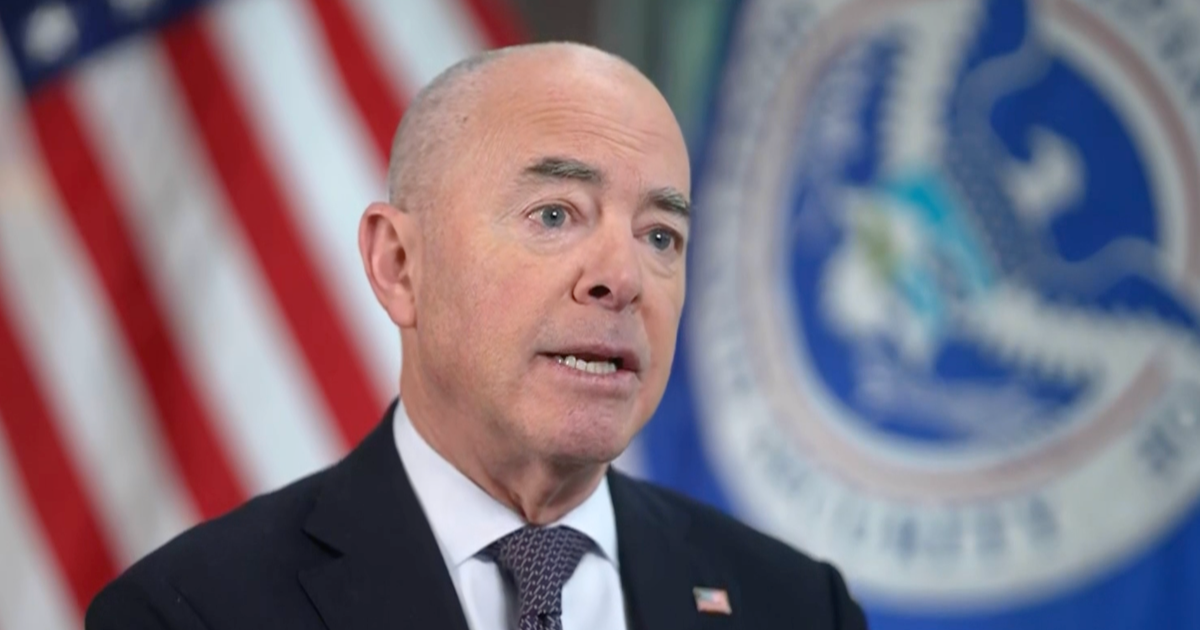
The following is the full transcript of an interview with Homeland Security Secretary Alejandro Mayorkas on “Face the Nation with Margaret Brennan” that aired on Dec. 22, 2024.
MARGARET BRENNAN: I want to talk to you broadly about the environment we are in. It’s a pretty significant one. Your potential successor, Kristi Noem, Donald Trump’s pick to run Homeland Security, has no law enforcement experience and has never worked at an agency like this. Have you spoken to her yet? And what do you think her biggest challenge will be?
SECRETARY MAYORKAS: I have. I have spoken with the governor. We had a very positive conversation. We are both perfectly aligned on our dedication to a smooth and effective transition. I care very deeply about the well-being of this department, dedicating so many years to public service, she expressed her dedication to the well-being of this department. She is a governor, so she knows how to lead, and I am optimistic and hopeful and dedicated to her success.
MARGARET BRENNAN: There have been hiccups with transition so far, in terms of even just the information that is being shared because of these lack of signing off on paperwork at certain government agencies. What is it going like? How smooth is it here?
SECRETARY MAYORKAS: Here, the transition team has landed at the Department of Homeland Security. We have begun to produce documents and provide information to the transition team. I happened to run into the transition team leader yesterday here at DHS headquarters and- and we are working well together.
MARGARET BRENNAN: But do you have a sense yet of what things will be like? You said you’re worried about the department. There’s a vow to cut back on bureaucrats. Do you think a lot of these workers that you say you’re dedicated to won’t have jobs in a few months?
SECRETARY MAYORKAS: Oh, I hope that’s not the case. We are, quite frankly, a perennially under-resourced department. You know, people take a look at our budget and, and think about how big it is, but one has to measure how big it is compared to what the mission demands are, and those mission demands are incredibly vast. Our department is a sprawling one. Our mission is extraordinarily diverse. Of course, the border receives a great deal of attention, but the cyber security challenges, the criminal investigative work that we perform, the disaster response that we execute, maritime security, our United States Coast Guard, our protective mission by United States Secret Service. We were speaking earlier of TSA and so much more. Our department- the challenge for the governor coming in is to address such a diverse set of missions, but fortunately, she will be able to rely on extraordinarily dedicated and talented experts in this department. We cannot afford to lose any.
MARGARET BRENNAN: This is a heightened threat environment on the foreign front, on the domestic front, we recently saw that killing of the United HealthCare division CEO on the streets of Manhattan. Manhattan prosecutors called it a killing that was intended to evoke terror. Would you consider him a terrorist? Is this domestic violent extremism?
SECRETARY MAYORKAS: Well, Margaret, it’s not for me to comment on a pending criminal case, I will not do that. First of all, let us take a step back and note the tremendous tragedy. A father of two children, a family man was murdered in New York City in cold blood, first and foremost. Secondly, you spoke of the heightened threat environment, the rhetoric on social media following that, that murder is extraordinarily alarming. It speaks of what is really bubbling here in this country, and unfortunately we see that manifested in violence, the domestic violent extremism that exists. The threat of it in the United States is one of the great threat streams that we must counter. Of course, there’s also the threat of foreign terrorism, as well as the actions of adverse nation states.
MARGARET BRENNAN: When you say something’s bubbling, what’s the national trend that you’re seeing?
SECRETARY MAYORKAS: I- look we have been concerned about the rhetoric on social media for some time–
MARGARET BRENNAN: –And that’s against CEOs, that’s against the government, that’s against leadership.
SECRETARY MAYORKAS: We’ve seen narratives of hate. We’ve seen narratives of anti-government sentiment. We’ve seen personal grievances in the language of violence, accompanying or being a part of those narratives, is something that we’re very concerned about, that, that is a heightened threat environment. I still am alarmed, though, by the the the heroism that is being attributed to an alleged murderer of a father of two children on the streets in New York City.
MARGARET BRENNAN: And a lot of that seems to be around the healthcare industry and what that company was doing, it’s depersonalized. The victim is depersonalized.
SECRETARY MAYORKAS: And and the victim is a person–
MARGARET BRENNAN: Yeah.
SECRETARY MAYORKAS: And the victim is a husband, and the victim is a father.
MARGARET BRENNAN: I ask you about a trend, because often these things are discussed in purely political terms, as political violence, but it seems like you’re saying it’s almost broader.
SECRETARY MAYORKAS: Oh it is. It is. It is not purely a political rhetoric. We see a wide range of narratives that’s- that really drive some individuals to violence, and we have a responsibility to know the threat landscape and see what we can do working with communities to prevent that violence from actually occurring.
MARGARET BRENNAN: I mean there were reports during the hurricane aftermath in North Carolina about militias looking for FEMA workers, for federal response workers.
SECRETARY MAYORKAS: So we had to pull FEMA workers out of the field who were responding to victims’ needs because of false information that was deliberately disseminated on social media, such as, ‘the FEMA worker is coming to take your land.’ Absolutely false. They are there at great personal sacrifice to help others. That’s who they are. And we had to pull them from the field by reason of that threat environment, temporarily, albeit, but nevertheless impactfully.
MARGARET BRENNAN: That just shows a massive not just distrust- but you were worried about the threat of violence against them
SECRETARY MAYORKAS: We most certainly were. And I have to tell you, the FEMA employee who is engaged in a search and rescue mission does not ask about the political party of the individual whom that FEMA employee is rescuing.
MARGARET BRENNAN: Well, should not.
SECRETARY MAYORKAS: That is- and does not, and that is a rescue operation.
MARGARET BRENNAN: We mentioned how broad your portfolio is. So I want to move to another part of that, the US border. ‘Face the Nation’ has been to the border, toured some of the federal facilities, and we saw some of those small children who came across without parents and without caregivers. And I don’t think- I certainly won’t ever forget that. There were also children who were separated from their families by the Trump administration. The last report we saw shows that Homeland Security reunified just short of 800 children with their parents. Why is it so hard to reunite families, and how much unfinished business are you leaving behind here?
SECRETARY MAYORKAS: So we are very proud of the work that we performed through the Family Reunification Task Force, a multi-agency effort that I led here in the Department of Homeland Security. But there’s more work to be done. Some of the parents who were removed are difficult to find. Some are reluctant to come forward, worried that the separation could occur again. We’re dealing with vulnerable populations who have gone through trauma. So there are a myriad of challenges, some of which we have been able to overcome, as you note, for 800 or so families, but there’s more work to be done.
MARGARET BRENNAN: How many are left?
SECRETARY MAYORKAS: It is unclear, because the- we were not left with good records, data was not kept, and so that was also one of the great challenges that we had to overcome. We could not have done our work, what we accomplished, without the partnership of groups in the community that had other connections to separated families.
MARGARET BRENNAN: Non-government agencies. ICE was also unable to account for more than 32,000 unaccompanied kids who failed to appear in court from 2019 to 2023 according to the report we read. The incoming border czar, Tom Homan, says these children are being exploited and trafficked. Is that true?
SECRETARY MAYORKAS: Well, we–
MARGARET BRENNAN: Do you know?
SECRETARY MAYORKAS: Margaret, we certainly have received reports of children being trafficked, even those as to whom we know where they are. That is outside the responsibility of the Department of Homeland Security. What we do is we turn children over within 72 hours, as the law requires, to the Department of Health and Human Services, and then HHS places those children. Of course, we investigate cases of trafficking, but there are children who are reunited with a parent here in the United States or a legal guardian, and they move and sometimes the government loses track. Individuals do not comply with the reporting obligations or otherwise, I think it is inaccurate to say that all of them are trafficked or victimized. There are a number of reasons why we might lose track of an individual that is not necessarily specific to this administration. That has been a long standing challenge in the immigration system, one example of why that system is so broken, why the duration of time in proceedings is unacceptably long and has to be remedied. Remember, we’re dealing with a system that was last reformed in 1996.
MARGARET BRENNAN: So what more can you do to combat the trafficking that is happening of some of these children, or the exploitation of some of these children, is that up to Congress as well, or can Homeland do more well?
SECRETARY MAYORKAS: We have done more. As a matter of fact, our entire worksite enforcement strategy has been to focus our criminal investigators and our other officers on employers who exploit vulnerable individuals, including underage individuals, and take advantage of the fact they that they are migrants seeking work in the United States and pay them substandard wages, have them employed in substandard working conditions and the like. And so that is where we have, I would submit correctly, focused our energies, and we’ve been unprecedented in that focus and in the success of that focus. We need more resources. The problem of the-
MARGARET BRENNAN: It’s a money problem?
SECRETARY MAYORKAS: We need more personnel. We certainly do.
MARGARET BRENNAN: But the exploitation of them, are you limited in your authorities at this point, when the Trump administration promises they will change it? Can they change it?
SECRETARY MAYORKAS: This was a- this has been a problem that has been decades long. This is not a new problem. I wish them tremendous success. I will support them in their efforts to end the scourge of human exploitation and human trafficking.
MARGARET BRENNAN: So at this point last year, in December of last year, border crossings were at record highs. Now they’ve dropped to the lowest level of the Biden administration. How much of that drop off is because Mexico is now stopping migrants from even getting to that southern border with the United States?
SECRETARY MAYORKAS: That is critically one element of it. It is not the only element of it. The President took decisive action after politics killed what would have been an extraordinarily enduring solution to what is a broken immigration system, that bipartisan legislation that I was very proud to be a part of would have- would have really delivered a solution. Because politics killed it, the President took executive action in June of this year, we began to execute very successfully and very rapidly that executive action. And that has been a key driver of the- the low number of encounters at our border we are now delivering to the incoming administration, a southern border at which the number of individuals encountered is well below the level experienced in 2019 the last year before the pandemic.
MARGARET BRENNAN: But the immigration surge into the US since 2021 has been the largest in American history.
SECRETARY MAYORKAS: Yes
MARGARET BRENNAN: That is incredible. So–
SECRETARY MAYORKAS: Oh, it is Margaret. It is one element of the greatest displacement of people in the world since World War Two. This is a phenomenon that has not been unique to the southern border of the United States. It- it is something that has gripped the entire hemisphere and the world. When I speak to our partners from the Five Eyes, our closest allies, Canada, the United Kingdom, Australia, New Zealand, they raise immigration as the first issue of concern to them. This is something not unique to the United States.
MARGARET BRENNAN: It’s not and it has tremendous political impact.
SECRETARY MAYORKAS: It has a tremendous political impact, and that is why we need Congress to act in the- in the- in the wake of Congress’s failure to act, the President took executive action, and therefore we’re delivering to the incoming administration a border that is more secure than it was in 2019.
MARGARET BRENNAN: But the Biden administration, and I think you have said to me, one of the very first things the Biden administration did was ask Congress to act in the earliest days, and then fast forward, you had this bipartisan near miss on a border bill all that time passed, why wait until five months before the US election to put in place those asylum restrictions that did cut off the flow? That ended the crisis?
SECRETARY MAYORKAS: Margaret remember where we were when the President took office. We were in the midst of the COVID-19 pandemic. The prior administration had imposed title 42 which is a public health authority, and enabled us to expel individuals, to continue to expel individuals at the border, as the prior administration had done. There was tremendous pressure to maintain the workings of Title 42 which we did. Remember- and that was pressure to maintain Title 42 a bipartisan pressure that–
MARGARET BRENNAN: — Which was pinned on the CDC as a health measure. But sure, yes.
SECRETARY MAYORKAS: That held until May of 2023 and we ended the workings of Title 42 because this country had escaped the throes of COVID 19 more rapidly and more successfully than any country in the hemisphere and, quite frankly, the world. We then turned to Congress and we asked for supplemental funding that was desperately needed to make our administration of a broken immigration system work much better. We were denied. We went back to Congress a second time and requested supplemental funding. Denied, despite a desperate need for it. We then turned to the bipartisan negotiations, which proved successful, which were then killed. The result of it, a really terrific solution was killed by irresponsible politics. Looking back now in hindsight, in 2020 if we had known that irresponsible politics would have killed what was clearly a meritorious effort and a meritorious result, perhaps we would have taken executive action more rapidly.
MARGARET BRENNAN: Because Republicans argue in this back and forth over whose job it is to fix the problem, Congress would argue there was executive authority that could have been used before Congress legislated, and they point back to the crisis, starting at day one, when Trump-era immigration policy was peeled back. Remain in Mexico, the 100 day moratorium on most deportations that was announced, the halt to wall construction. Did those measures, and I know you weren’t yet in office, personally, but did those measures set you up for failure?
SECRETARY MAYORKAS: Remember something, Remain in Mexico is touted as the great panacea. In 2018, and I will be approximate in my numbers Margaret, in 2018 there were approximately 550- 560,000 individuals encountered at the southern border. Remain in Mexico was implemented in January of 2019. In 2019 there were approximately 960- 970,000 individuals encountered at the southern border. The trend lines of migration were increasing quite exponentially from 2018 to 2019 and that is reflected worldwide. And then the COVID-19 pandemic hit. Remember something also about the executive action that the President took in May- in- in June of this year. We also, over time, built capabilities that we did not previously have. Not just domestically, the number of facilities that we stood up, the ability to transport individuals and decompress areas that were experiencing surges of individuals, but our negotiations with Mexico, with other countries in Latin America and around the world. We are now removing or returning more individuals in three years than the prior administration did in four. And we are doing so not only greater in volume, but greater in speed, because of the negotiations with other countries and to more countries than has ever been the case. We have been removing Chinese nationals who have no lawful basis to remain in the United States back to the People’s Republic of China for the first time since 2018 and we have run a number of removal flights to that country.
MARGARET BRENNAN: Well, why didn’t we hear more about those enforcement actions during the election cycle, when immigration was so key?
SECRETARY MAYORKAS: Margaret, we’ve been executing on enforcement at an unprecedented level throughout this administration. And ICE just published data that evidences that quite powerfully.
MARGARET BRENNAN: Yeah, on that data. So, President Obama was referred to by activists as the deporter in chief, because of the large number of deportations on his watch. But that data you just cited shows deportation of migrants is at a 10 year high under President Biden. A 10 year high. So what shifted at DHS that- that prompted this deportation of more than what 200,000 unauthorized migrants from the United States this year. That- that’s one of the highest numbers in recent years–
SECRETARY MAYORKAS:– Margaret–
MARGARET BRENNAN: — If Congress didn’t give you the power, how did you do it?
SECRETARY MAYORKAS: Margaret, we did it with skill, with strategy, and with unflinching dedication to that mission, and let me share with you, I am an immigrant to this country, and what this country gave me drove me to public service. I spent my first 12 years in government service as a federal prosecutor, and the conclusion that I have lived and the conclusion that defines this country is the following, that we are a nation of laws and a nation of immigrants, and if individuals do not have a lawful basis to remain in the United States, we will remove them.
MARGARET BRENNAN: But it would also suggest that there is the ability to do it without Congress acting, right? That’s the downside of showing you can make it work.
SECRETARY MAYORKAS: Yes- but Margaret, we made those very impressive statistics happen. But there is much more work to do, and what we have to do is to ensure that the problem does not continue. This broken system needs to be fixed. And it’s not just to ensure that individuals who do not have a lawful basis to remain in the United States are removed, but it’s also to ensure that we are providing humanitarian relief to those who qualify one of our proudest traditions, and that we are also fueling the economy. Our need for skilled labor is something that we hear from companies and public officials, regardless of party affiliation, and yet we are capped at the number of skilled workers that we can introduce into the United States economy. By figures, by ceiling set in 1996.
MARGARET BRENNAN: You’re talking about H-1b visas and skilled worker visas, things like that.
SECRETARY MAYORKAS: Yes.
MARGARET BRENNAN: But in terms of the enforcement actions here, Goldman Sachs estimates more than half of the migrants since 2021 entered illegally. Does that sound right to you? Roughly 5 million people entered the US illegally?
SECRETARY MAYORKAS: Remember, a certain number were encountered at the border. But we have, as you cited earlier, we have removed, returned and expelled, given the operation of Title 42 during the COVID-19 pandemic, an extraordinary number, and we continue to return or remove individuals. But there is no question, there is no question, and this is a sign of a broken immigration system- that individuals who were encountered at the border are in the United States, but they are in immigration enforcement proceedings. One of the problems is that those proceedings take seven to ten years before they’re resolved, because our immigration court system is so backlogged, and that backlog has been increasing year, over year, over year, ever since I can remember and I entered the Department of Homeland Security for the first time in 2009.
MARGARET BRENNAN: Well, Donald Trump says within the first 100 days, they’re going to have a surge of resources through Congress to carry out what he is calling mass deportations. The former ICE chief Tom Homan, who used to work with you.
SECRETARY MAYORKAS: Yes.
MARGARET BRENNAN: We went back and looked. He’s praised you. He said, “Me and Ali didn’t always agree on immigration, but he listened. He’s a great American, and he loves this country.”
SECRETARY MAYORKAS: That is, that is true. That is-
MARGARET BRENNAN: — A lot has changed–
SECRETARY MAYORKAS: I love- I love this country. I’ve worked very closely with Tom Homan, and I’m very proud of the work that he and I performed together.
MARGARET BRENNAN: But he said you had a where he told Tucker Carlson, you two had a falling out over transgender policy and ICE detention facilities, and he was forced to sign something that provided medical care to them. Is that how you remember things and- and this is the person who will be part of carrying out the policies you say need to be fixed?
SECRETARY MAYORKAS: I was disappointed to learn of that statement that’s not true.
MARGARET BRENNAN: That wasn’t a falling out between the two of you?
SECRETARY MAYORKAS: No, I didn’t have a falling out with- with Tom Homan. We worked very well together throughout my tenure as the Deputy Secretary of the Department of Homeland Security. I was disappointed to hear that.
MARGARET BRENNAN: Is that just politics?
SECRETARY MAYORKAS: I- I can tell you this, it’s not true. Whatever it is, is not true.
MARGARET BRENNAN: You have been the recipient of a lot of upset over the immigration policy because of your job. You are the face of it, right? And the Republican House impeached you. I wonder when you leave this office, are you concerned about your personal security?
SECRETARY MAYORKAS: Margaret, I’m incredibly proud of the work that this department has done over the past four years as I’ve been privileged to serve as its secretary. I’m very sad to leave the department, and it mirrors the sadness I have felt each time. I have left the federal government as a political appointee. I started as a career appointee. I have- I have faith in the American people. That faith is when we see a cold-blooded murder of a United Health Care executive, it’s- it’s rattled, but that’s the actions of a- of an individual not reflective of the American public and of the democracy in which we live. I am the face- I am the face of it, and that is a responsibility I willingly assumed when I agreed to take this position.
MARGARET BRENNAN: Yeah, it’s a question. And you know why I had to ask it because of the environment we’re in. I want to ask you about China, if I could, before we go. You said recently that this massive Chinese hacking known as Salt Typhoon, the hacking of eight telecom companies that siphoned up this metadata, the phone call records, logs and information for millions, potentially of Americans, was accessed. Why hasn’t the US government stopped it?
SECRETARY MAYORKAS: Well, first of all, the intrusion is a very significant one and an extraordinarily impactful one and an absolutely unacceptable one. And the President has demonstrated a strong response to the People’s Republic of China. It is very sophisticated–
MARGARET BRENNAN: — Rhetorically?–
SEC. MAYORKAS: I’m sorry,
MARGARET BRENNAN: Rhetorically? When he met with Xi Jinping?
SECRETARY MAYORKAS: Well, just recently, the United States Department of Commerce proposed an action against China Telecom. So this is an ongoing situation. It is not static. The intrusion is a very sophisticated one. The telecommunications companies are working very vigorously to remediate it. They are working in partnership with us, with the cyber security and infrastructure security agency within the Department of Homeland Security, with the Federal Bureau of Investigation and other agencies of the federal government. So this is a partnership in an effort to remediate the situation. It is very complicated, and we’re very dedicated to it.
MARGARET BRENNAN: This is the largest intelligence compromise, potentially in US history.
SECRETARY MAYORKAS: It is a very serious compromise, and requires very serious action to remediate and recover from it, and also very serious response to it.
MARGARET BRENNAN: How did you find it?
SECRETARY MAYORKAS: That is not something I can- I can speak to.
MARGARET BRENNAN: The incoming national security advisor to Donald Trump, Mike Waltz was on Face the Nation last Sunday and said the US needs to go on offense, start imposing higher costs and consequences to people and entities like countries stealing data, but also to those who spy on us they are, “literally, putting cyber time bombs on our infrastructure, our water systems, our grids, even our ports.” A cyber time bomb. Is that what’s happening?
SECRETARY MAYORKAS: You- we started our discussion speaking about a heightened threat environment, and I identified three vectors, three primary vectors, the threat of foreign terrorism. And obviously we’re keenly focused on the instability in Syria, and whether that can create some space for the reemergence of ISIS there. And foreign terrorism is, of course, the founding reason for our Department of Homeland Security, the threat of domestic violent extremism. And we’ve talked about that and I mentioned the actions of adverse nation states. It is really an extraordinary time now. Adverse nation states have exhibited a willingness to use the cyber domain in an effort to. To threaten our homeland security and our national security. The infiltration, the hack of the telecommunications companies is one example. We’ve seen critical infrastructure hacked as well, and it does require a response, and I am confident that the incoming administration will be vigilant in executing that response.
MARGARET BRENNAN: Would you put that at the top of the list for the incoming Secretary?
SECRETARY MAYORKAS: Would put that at the top of the list. Whether it’s at the very top, I’d want to think through, but it is at the top of the list most certainly.
MARGARET BRENNAN: Lastly, as you come to the time, as you come to the end of your time here, what is the thing that keeps you up at night?
SECRETARY MAYORKAS: Margaret, we- it’s not singular. It’s not singular. Our mission space is so vast. Our mission is so diverse. There are challenges in each area of this department. If you asked me for an embracing concern, it is the safety and security of the American people that is our commitment, and ensuring that that is preserved and not in any way encroached upon, is our highest obligation, and I’m incredibly proud to serve it.
MARGARET BRENNAN: Mr. Secretary, thank you for your time. Thank you,
SECRETARY MAYORKAS: Thank you, Margaret.
CBS News
Why drone hysteria has taken off

Dating back a month now, you’ve either seen them in the sky, or you’ve seen them on the news: Drones seem to be everywhere. By all accounts, alleged drone sightings are multiplying exponentially, with more than 5,000 reported in just the past few weeks alone.
But of those 5,000, only a hundred or so have generated actual law enforcement leads.
George Mason University engineering professor Missy Cummings, who has been doing drone research for 25 years, says what most people are actually seeing are likely aircraft, stars, or reflections off of objects, like towers. “Of all of those options, drone is the least likely, because it’s actually pretty hard to pick these out of the sky,” she said.
We heard a similarly ordinary explanation for these extraordinary lights-in-the-sky when we visited New Jersey’s Monmouth County Sherriff Shaun Golden this past week. “The majority of these sightings are probably some type of commercial o recreational manned aircraft,” he said.
In other words, no imminent threat. As a joint statement from the Department of Homeland Security, the Department of Defense, the FAA, and the FBI, put it on Tuesday, “[We] do not assess the activity to date to present a national security or public safety risk.”
Cummings said, “If you’re actually looking at lights from a drone, it means that you’re definitely not looking at a foreign adversary, because they’re sophisticated enough to turn the lights off.”
And yet, some of the American public have been a little on edge.
The best approach for the moment, according to Cummings, is that we should all try to stay grounded: “If I go on the news and tell you, ‘You have something to worry about,’ then you have something to worry about,” she said. “But in this case right now, really, things are operating as usual.”
For more info:
Story produced by Amiel Weisfogel. Editor: Joseph Frandino.





